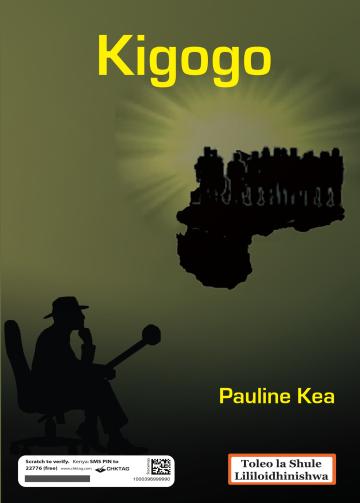- Majoka, the president of a corrupt government, in a poetic fiction by renowned Swahili writer Pauline Kea meets his downfall in a riveting tale of resistance and justice
- While many Gen Zs who took to the streets were examined on this set book while in high school, it remains to be seen how literature could play a role in birthing a new Kenya that has suffered under the yoke of President William Ruto’s regime
- The book narrates how corruption and tyranny are challenged, igniting hope for a future shaped by integrity and accountability
‘Kigogo,’ a set book that has been a staple in Kenyan high school literature curriculums, has recently been highlighted as a significant factor in the political reawakening among the country’s Gen Z population.
The book, which primarily critiques corrupt leadership, has resonated deeply with young Kenyans and is credited with inspiring recent protests, including the dramatic storming of Parliament and calls for President William Ruto’s resignation.

Overview of ‘Kigogo’
Authored by Pauline Kea, ‘Kigogo’ delves into the lives of fictional characters who navigate a society plagued by corruption, exploitation, and abuse of power. The narrative revolves around the reign of Majoka, a tyrannical leader whose government is characterized by gross corruption and a blatant disregard for the welfare of the people.
Through vivid storytelling and complex characters, the book paints a stark picture of the detrimental effects of corrupt leadership on ordinary citizens. The narrative’s central theme revolves around the struggle for justice and integrity in the face of oppressive governance, making it a powerful tool for social commentary.
Majoka’s Government and Its Impact
Majoka’s regime is depicted as a government steeped in corruption and cruelty. He and his cohorts enrich themselves at the expense of the populace, manipulating systems and exploiting resources to maintain their grip on power.
The book vividly illustrates how Majoka’s government inflicts suffering on the people through oppressive policies and brutal enforcement. Public resources are misappropriated, dissent is ruthlessly crushed, and the common citizenry is left to bear the brunt of the regime’s greed and incompetence.
Follow our Facebook page for more updates:
Majoka employs a combination of propaganda, fear, and brute force to silence opposition and maintain control. The regime’s security forces are notorious for their brutality, and the judiciary is compromised, ensuring that justice is out of reach for the average person. This creates an atmosphere of fear and hopelessness among the people, who feel trapped and powerless to effect change.
The Struggle and Downfall
Despite the oppressive environment, ‘Kigogo’ showcases the resilience and determination of those who dare to resist Majoka’s rule. The book follows the journey of brave characters who risk their lives to expose the regime’s atrocities and rally the masses towards rebellion. Their actions spark a wave of dissent that gradually builds momentum, culminating in a mass uprising.
As the narrative progresses, the cracks in Majoka’s regime begin to show. Public discontent reaches a boiling point, fueled by the courage of those who stand up against corruption and demand justice. The turning point comes when the regime’s brutal actions are laid bare for all to see, stripping away the veneer of legitimacy that Majoka had carefully constructed.
Follow our Facebook page for more updates:
In a dramatic and poetic conclusion, Majoka’s regime collapses under the weight of its own corruption and the relentless pressure from a populace that has found its voice. The once-feared leader is left in disgrace, his downfall a testament to the power of collective action and the unyielding human spirit.
Impact on Gen Z
For many Gen Z students, ‘Kigogo’ has been more than just a literature assignment. The book’s portrayal of corrupt leaders and the societal consequences of their actions have struck a chord with young readers who see parallels in their own country’s political landscape. This generation, characterized by their access to information and social media savvy, has used the lessons from ‘Kigogo’ to fuel their activism and demand accountability from their leaders.
Catalyst for Protests
The influence of ‘Kigogo’ became particularly evident during the recent protests against the Finance Bill 2024, which introduced new and unpopular taxes. As MPs voted in favor of the bill despite widespread public opposition, young Kenyans, inspired by the anti-corruption themes in ‘Kigogo,’ took to the streets in unprecedented numbers.
Follow our Facebook page for more updates:
The protests culminated in the storming of Parliament, an act that many attribute to the anger and disillusionment stoked by the book’s depiction of corrupt leadership.
The Role of Literature in Political Activism
‘Kigogo’ serves as a potent reminder of the power of literature to influence and inspire political activism. By exposing young readers to the consequences of corruption and the importance of ethical leadership, the book has played a crucial role in shaping the political consciousness of Kenya’s Gen Z.
Follow our Facebook page for more updates:
It has provided them with a framework to understand their frustrations and a narrative that legitimizes their demands for change. The set book ‘Kigogo,’ which critiques corrupt leadership, has significantly influenced Kenya’s Gen Z, inspiring them to demand accountability from their leaders. Its themes of justice and resistance have fueled recent protests against the Finance Bill 2024, including the dramatic storming of Parliament.

